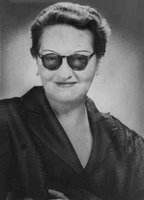 Marta Brunet's "Piedra callada" is a chilling little tale of long-guarded resentment, terse conversation, and sudden violence; it's reminiscent somewhat of a Flannery O'Connor short story, but with southern Chile standing in for the US Deep South. Two implacable wills face off against each other: the mother, Eufrasia, who has opposed from the start her daughter's marriage to a lowly, sullen peon; and the son-in-law, Bernabé, who refuses to be parted from his children following his wife's death.
Marta Brunet's "Piedra callada" is a chilling little tale of long-guarded resentment, terse conversation, and sudden violence; it's reminiscent somewhat of a Flannery O'Connor short story, but with southern Chile standing in for the US Deep South. Two implacable wills face off against each other: the mother, Eufrasia, who has opposed from the start her daughter's marriage to a lowly, sullen peon; and the son-in-law, Bernabé, who refuses to be parted from his children following his wife's death.Or rather, this is not so much a "face off" as the mother knows that to get her way she might have to proceed "by short cuts, clambering around, biding her time, if the direct route was made arduous and full of obstacles" (39). Hence she is consistently seen only in profile (e.g. 46, 54, 60, 64) as she half turns away, seeking to slip to one side or another, looking askance at her surroundings: "The old woman, always turned to one side [siempre de perfil], observed [Bernabé] out of the corner of her eye" (59).
There is something aslant or crooked also about the son-in-law: his eyes, for instance (40), and he too takes in the changes Eufrasia has wrought by looking at them only indirectly (49). But his characteristic movements are less from side to side than up and down. In the presence of hacendado and mother-in-law alike he hangs his head, slouching as though admitting defeat ahead of time (40, 58). And when his ill-named wife Esperanza ("Hope") dies, it's "as though his head had all of a sudden buried itself in his shoulders" (50).
Increasingly, Bernabé's anger literally swells up from deep within his body, his arms, his hands. But it's not for nothing that even Esperanza, pleading to be allowed to marry him, has to admit that he's clumsy, heavy, slow-witted [lerdo] (36, 37). Eufrasia by contrast is "prodigiously agile, quicker in thought than he" and also quicker to move: she "side-step[s] immediately," leaving him behind when threatened (60).
Neither of these two rivals is distinguished by their use of language. Bernabé is taciturn to the point of dumbness, managing only a grunt or two for the most part, and "drowning in words" when he is called upon to say more (62). Eufrasia's silences, by contrast, are part and parcel of the long game that she's playing as she watches and waits for her opportunity to strike.
And when strike she does, it's to force Bernabé likewise to step off to one side: but here this involves his slipping and falling; unlike her, he's lost if he cannot move ahead and straight. Eufrasia wins out (was there ever really any doubt that she would?), though in a chilling final paragraph that reminds us how imperceptible her wayward track has been, she leaves the door open "because as far as the others were concerned, the man might still return" (65).
No comments:
Post a Comment